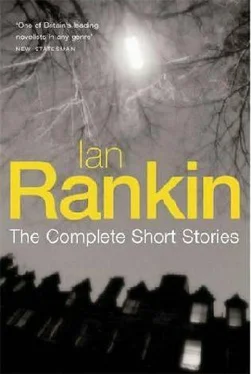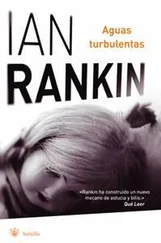Caldwell glanced at Trent’s wife, who was as usual putting away double the drinks her husband was. Not that she couldn’t hold the stuff, but it was always quantity over quality with Stella, and this irked Caldwell. Put the finest Burgundy in front of her and she slugged it like it was off the bottom shelf at Thresher’s. He’d seated Parnell Wilson next to her, in the hope that the racing driver’s tanned good looks would take Stella’s mind off grain and grape. But Wilson was too obviously besotted with his girlfriend, Fran, who sat directly opposite him. From their looks, Caldwell knew they were playing some provocative game of footsie under the table. And why not? Fran was like all Wilson’s conquests: tiny and gorgeous and leaping out of what dress there was, naked skin the only cloth that would really suit her.
Caldwell had a large share in the syndicate which owned Wilson’s racing team. Not that Caldwell enjoyed the sport: frankly, he could see no point to it. But he did enjoy the travelling – Italy, Brazil, Monte Carlo – and he always met interesting people, some of whom turned into useful contacts.
Final guests: Sir Arthur Lorimer and his museum-piece of a wife. Lorimer was a judge and near-neighbour, and it pleased Caldwell to have the old soak here. Cultivate the Establishment: Trent’s second piece of advice. His reasoning: if you’re ever found out, it reflects badly on them, and as a result they’ll try to ignore what misdemeanours they can. Caldwell hoped he’d never have to put this to the test. But that might be up to Hunter.
There’d been a phone call earlier from Franz in Dortmund, just to wish him a happy and prosperous new year.
‘With your help, Franz,’ Caldwell had said. They never said very much on the phone. You never knew who was listening, even at Hogmanay. It was all codes and intermediaries.
‘Your party’s tonight?’
‘In full flow. I’m sorry you couldn’t make it.’
‘Business so often interrupts my pleasures. But I’m sending a little token, Patrick. A gift for the millennium.’
‘Franz, you needn’t have.’
‘Oh, but it’s nothing really. I look forward to seeing you soon, my friend. And enjoy what’s left of your party.’
Enjoy what’s left.
They were on dessert when the doorbell rang. Caldwell decided to answer it himself, thinking of Franz’s gift.
A man was standing on the porch. He was dressed all in black, smiling, pointing a gun directly at Caldwell’s heart.
Franz knew he was going to have to head up to Denmark. Those damned Hell’s Angels and their little squabbles. All that tribalism was so bad for business. Not that they cared much about business, all they cared about was themselves. They reminded him of nothing so much as feuding families in some American cartoon book, a face-off between two mountain shacks. It had started as a question of territory – almost always his business disputes were to do with encroachment. That was why meetings were so important, so lines of demarcation could be drawn. But these bikers… put them in a room together and the hate was like some fug in the air, sucking out oxygen and replacing it with toxic gas.
He needed couriers to Denmark, and the Angels were good at their job. But they lacked dedication. And he definitely didn’t need a war starting up between rival chapters. He needed that like he needed a hole in the head.
He thought of Caldwell’s gift and allowed himself a smile.
No visitors to Franz’s home this night. Few visitors on that day of the year. He conducted business from an office in the city, and travelled often. But here, in this fortress he had constructed, spending the best part of DM300,000 on security alone, here he felt safe, felt a certain tranquillity at times. These were the moments when his thinking was at its best, when he could plan and debate. Beloved Mozart on the stereo, and tonight not the Requiem – not on a night that should be a blossoming of hope and fresh intentions.
His second fresh intention: after the diplomatic trip to Denmark, a further trip to Afghanistan. He’d heard worrying reports of depleted harvests, and of crops and fields being burned by suddenly efficient soldiers. He’d asked an associate in Chicago what the hell they thought was going on.
‘Blame our fucking dick-dipping President. He’s trying the same shit he pulled in South America. “Be my friend,” he tells them. “Let me loan you money, billions of dollars of clean government money. Use it to rebuild your infrastructure or line your private Zurich bank vault. But just get rid of all the shit you grow.” It’s all politics, as usual.’
The voice from Chicago was distorted – a side-effect of the scrambler. At least no one would be listening in.
‘I don’t understand,’ Franz had said – though he did. ‘I thought we had arranged for friends to be placed where they could help us.’
‘What can they do? CBS go prime-time on a field of burning poppies, then up pops the Prez to say he did it. His ratings jump a couple of points, Franz, this guy would do his dear departed grandma in the ass for a couple of points.’
End of conversation.
Sad really, to think that decisions taken a continent away could affect one so much, but thrilling too. Because Franz saw himself as part of a network which embraced the globe, and felt his importance, his place in the scheme of things. If they ever set up colonies in space, he wanted to be supplying them. Dealer to the universe, by appointment to infinity…
Mozart silent now. He hadn’t realised, but midnight had come and gone. Then a buzzer sounding: the guardroom, one of his men informing him of intruders entering the compound.
It was not yet quite dawn, and Kejan lay in the darkness, as he had for the preceding five hours, his eyes staring, ears attuned to his wife’s light breathing. Three of their children slept in the room with them. Hama, the youngest, coughed and turned, made a slight moan before relaxing again. Kejan didn’t know if he’d ever relax again in his life, ever sleep again on this earth. Would the soldiers fulfil their promise and return to torch the shacks by the side of what had once been fields full of crops? Those fields had been Kejan’s future. Not that he’d owned them: the owner was a brutal man, a slave-driver. But Kejan had mouths to feed, and what other work was there? Now, with the fields reduced to cinders, he could only wait and wonder: would the soldiers drive the families away? Or would the Bossman chase them off his land, now that there was no work for them?
It was a matter of time. It was for the future.
He tried to envisage a future for his wife, his three children. He had more than once caught the Bossman staring at his wife, running his tongue over his bottom lip. And talking to her once, too, though she would not even admit it, kept her eyes on the ground as she denied and denied.
Kejan had slapped her then, the bruise a lasting smudge against her cheekbone. It didn’t seem to want to go away.
There were so many things Kejan didn’t understand.
The soldiers passed around lighted torches. Their commander, arguing with the Bossman. The Bossman saying that he always paid, that he always kept everyone sweet. The commander not listening, the Bossman persistent. Soldiers fingering their weapons, noting that the Bossman’s men were better armed with newer, gleaming automatics.
‘Orders,’ the commander kept saying. And: ‘Just let us get on with it for now.’
‘For now’: meaning things might be okay later, that this had some deeper meaning which the commander felt unable to share.
But later… later there would be other workers, willing workers. New people could always be found later. Now was what mattered to Kejan. He lived from moment to moment in this dark, overcrowded room. He waited for the moment he knew was coming, when the future would become the present and he would be consigned to the road with his family.
Читать дальше












